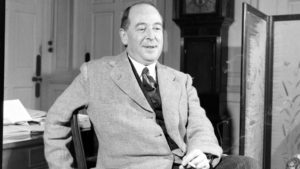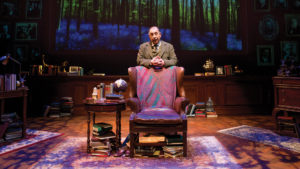When one thinks of live theatre the common assumption is that it is a bastion of liberal thinking where playwrights, actors and directors are usually preaching to the converted about the ways of the world. Enter playwright/actor/director Max McLean with C.S. Lewis Onstage: The Most Reluctant Convert. The show is now playing at the Broad Stage in Santa Monica and will continue there through Sunday, July 21st.
Max McLean is the Founder and Artistic Director of Fellowship for Performing Arts. They are a New York-based organization that seeks to produce theatre with a Christian point-of-view.
C.S. Lewis is perhaps best known for the novels The Chronicles of Narnia and The Lion, The Witch and the Wardrobe.
When McLean agreed to talk to me about The Most Reluctant Convert, he was informed in advance that he would be speaking with a confirmed atheist. Here are excerpts from our conversation.
In general why do you think anyone goes from being an atheist, as C.S. Lewis was, to being a Christian?
I think atheism is very attractive. You are your own boss and you don’t have to submit to anything. I think our natural instinct is to run away from God. From a Christian perspective there are two worlds: the material world and the supernatural world. And the supernatural world invades the material world. It is that invasion, that pull, that is compelling in the sense that it does the work to bring you into communion with God.

Specifically in C.S. Lewis’ case, what motivated his conversion?
You have to see the play. He grew up in a relatively Christian home. He did say they went to church, they said their prayers, His comments and the play itself come almost exclusively from Lewis’ writings. The first thing that happened early in his life, which shook him deeply, is he lost the glue of his family – his mother – when he was nine years old. Later he was in the trenches in France during World War I and he saw the butchery of God. He thought either there is no God in the universe or worse there is an Evil God. That’s where he lived from 1914-1915 before his slow conversion process. One was to a vague absolute and that moved him to a garden philosopher’s type of God and then to a personal type of God.
How does his conversion influence our view of his work and what he was accomplishing by writing his stories?
Our company realized that you really have to engage the imagination. Lewis seems to be the best at doing that in terms of articulating the Christian faith through Narnia, The Screwtape Letters and his non-fiction works. It seems to be the idea that people have of contemporary Christianity is a bunch of naive fundamentalists that need to be englightened. Lewis draws a different picture, a much more imaginative one.
Is it possible that atheism allows for spiritual life, but also does not follow the tenets of an established religion?
The idea of having mortality. That sounds more agnostic than atheist. The idea that there’s something out there and I just don’t know yet. But it is a negation of God. I suppose if you were articulating an agonistic position, yes there’s that possibility. That assumes you are open to the search.
But I’m talking about a belief in a broader purpose, a higher power within the self. Not something external by some omnipotent entity.
That sounds a little Buddhist to me. That there is no God and you become part of the overall part of the universe. In a certain sense Lewis was in that position when he moved from pure atheism to the possibility of the absolute. The ability to think, the ability to infer, must be a real participation in something further up and further in. Otherwise the material explanation of that ultimately is pure determinism – physics and biology and our minds are no more than atoms and neurons. Our most profound thought that we have, whatever that may be, is a product of heredity and physics. Lewis said, “my brain can’t go there.” And that was the first step toward theism.

What role do the most visible and public ways of Christian today serve to diminish the public’s belief in it serving a vital role? For example, ministers with private jets, getting publicly involved in politics and more. Has Christianity been perverted today?
Yes. That’s almost undeniable and yet it’s also written into it because the basic, the most scientifically verifiable fact about the doctrines of Christianity, is the doctrine of original sin. The corruption in our heart is deep. There are reasons for that that Lewis expresses brilliantly in The Screwtape Letters. Your assessment is undeniable. However, I think there is a remedy for that. The culture loves second chances and that is truly rooted in the Christian gospel. That’s where our culture gets it from.
In Bluspels and Flalansferes: A Semantic Nightmare, Lewis writes “Reason is the natural order of truth; but imagination is the organ of meaning.” He was arguing about the use and role of metaphor. Since many of the major religions tell the same stories/parables with different names and settings, aren’t religions ultimately best viewed as metaphors?
The way I understand it is if an idea doesn’t capture your imagination, if an idea isn’t big enough, creative enough, emotional enough, to capture or win your imagination, we’re not going to use your rational faculty or faculty of deduction and inference, logic to sort it out. I think one of the biggest challenges Christianity has is that somehow it has failed to capture enough people’s imaginations. This is where Lewis is at his strongest. His great theme is making it so fascinating imaginatively that you are willing to invest the logical tools to sort it out. It is worth investigation. That’s what Lewis did to me. That’s really why I’ve invested so much in C.S. Lewis.
For tickets go here.
Main photo: Max McLean as C.S. Lewis (Photo by Lancia E. Smith)










